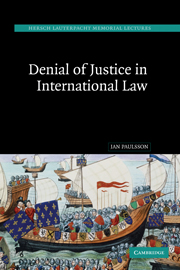Book contents
- Frontmatter
- Table of Contents
- Acknowledgements
- Authorities
- Abbreviations
- 1 The renaissance of a cause of action
- 2 The historical evolution of denial of justice
- 3 Three fundamental developments
- 4 The modern definition of denial of justice
- 5 Exhaustion of local remedies and denial of justice
- 6 Denial of justice by outside interference
- 7 Denial of justice by the decision-maker
- 8 Remedies and sanctions
- 9 The menace of ‘obscure arbiters’?
- Bibliography
- Index
1 - The renaissance of a cause of action
Published online by Cambridge University Press: 29 July 2009
- Frontmatter
- Table of Contents
- Acknowledgements
- Authorities
- Abbreviations
- 1 The renaissance of a cause of action
- 2 The historical evolution of denial of justice
- 3 Three fundamental developments
- 4 The modern definition of denial of justice
- 5 Exhaustion of local remedies and denial of justice
- 6 Denial of justice by outside interference
- 7 Denial of justice by the decision-maker
- 8 Remedies and sanctions
- 9 The menace of ‘obscure arbiters’?
- Bibliography
- Index
Summary
By what artifice might a state owe a duty to the world at large to maintain an adequate system for the administration of justice? It is one thing for states to assume obligations at their own diplomatic initiative. Few would question that legal duties will flow from a treaty by which two states promise each other that their nationals will be afforded a certain standard of treatment if they are accused of crimes in the other country, or a multilateral agreement by which each state promises all other signatories to abide by certain rules for international trade and investment. But by what contrivance is a state to be held responsible for an imperfect judicial system? When did any state make promises to that effect?
The answer is that the duty to provide decent justice to foreigners arises from customary international law. Indeed, it is one of its oldest principles. From the Renaissance to the First World War – an international lawyer might say from sometime before Grotius to sometime after Calvo – claims of denial of justice were the staple of international legal disputes. There is nothing surprising here. Like most institutions, the nation state did not emerge full-blown and powerful, but inchoate and vulnerable. The territorial integrity of a polity aspiring to statehood would not long remain inviolate if it failed to warrant that it was not a zone of chaos and lawlessness.
- Type
- Chapter
- Information
- Denial of Justice in International Law , pp. 1 - 9Publisher: Cambridge University PressPrint publication year: 2005



